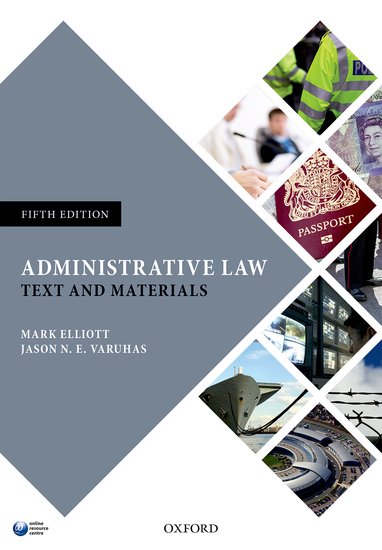 The 5th edition of Administrative Law, written by Mark Elliott and Jason Varuhas, was published in 2017 by Oxford University Press. The book is aimed primarily at undergraduate students studying modules in Administrative Law and Public Law. The book combines extracts from key cases, articles and other materials with detailed commentary, giving students an accessible casebook and textbook in one volume. Questions and further reading provide students with prompts for discussion and opportunities for further study.
The 5th edition of Administrative Law, written by Mark Elliott and Jason Varuhas, was published in 2017 by Oxford University Press. The book is aimed primarily at undergraduate students studying modules in Administrative Law and Public Law. The book combines extracts from key cases, articles and other materials with detailed commentary, giving students an accessible casebook and textbook in one volume. Questions and further reading provide students with prompts for discussion and opportunities for further study.
Every chapter in has been thoroughly updated, and many chapters have been substantially rewritten. Major recent cases are analysed, including R (Cart) v. Upper Tribunal [2011] UKSC 28 [2012] 1 AC 663 (on jurisdictional error and the relationship between courts and tribunals), R (Jones) v. First-tier Tribunal [2013] UKSC 19 [2013] 2 AC 48 (on the law/fact distinction), Braganza v. BP Shipping Ltd [2015] UKSC 17 [2015] 1 WLR 1661 (on the scope of the public law principles), R (Bourgass) v. Secretary of State for Justice [2015] UKSC 54 [2015] 3 WLR 457 (on the delegation of authority) and AXA v. Scottish Ministers [2011] UKSC 46 [2012] 1 AC 868 and Walton v. Scottish Ministers [2012] UKSC 44 [2013] PTSR 51 (on standing).
The new edition also takes account of and analyses new trajectories that are discernible in English administrative law. For instance, there have been important developments in relation to the procedure by which judicial review is undertaken and the restrictions that apply to judicial review. In this area, the book charts the increasingly significant impact of human rights claims on core features of the judicial review procedure, and the pressure such claims have placed on (what remains of) the procedural distinction between public and private law. Meanwhile, the book identifies and examines a sea change in the judicial approach to policy which today, far from being considered a threat to discretionary decision-making, is often seen by the courts as a tool for disciplining the exercise of administrative discretion so that it conforms to the rule of law values of certainty, consistency and openness. The chapters dealing with administrative justice mechanisms — ombudsmen, tribunals and inquiries — have also been thoroughly updated and, in places, rewritten to take account of developments in those areas, including recent and proposed changes to various public sector ombudsmen systems, and the enhanced role now played by the Upper Tribunal in immigration-related matters.
Further information about Administrative Law can be found on the Oxford University Press website.
